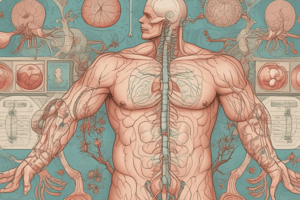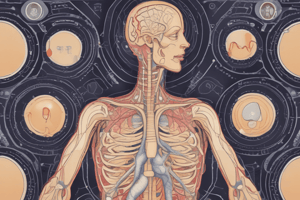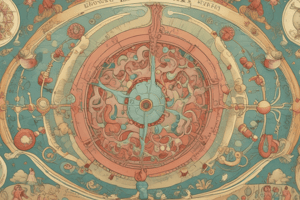Podcast
Questions and Answers
What type of hormone may be taken orally due to its lipid-soluble nature?
What type of hormone may be taken orally due to its lipid-soluble nature?
- Adrenal cortex hormones (correct)
- Neuropeptides
- Protein hormones
- Peptide hormones
What is the term for the specific cells that respond to hormone action?
What is the term for the specific cells that respond to hormone action?
- Stimulating cells
- Receptor cells
- Hormonal units
- Target cells (correct)
Which mechanism controls hormone secretion based on the concentration of the substance that it regulates?
Which mechanism controls hormone secretion based on the concentration of the substance that it regulates?
- Tropic Hormones
- Positive Feedback Mechanism
- Negative Feedback Mechanism (correct)
- Nervous Stimulation
What type of hormones stimulate the secretion of other hormones?
What type of hormones stimulate the secretion of other hormones?
How do protein hormones differ in their administration compared to steroid hormones?
How do protein hormones differ in their administration compared to steroid hormones?
What is the primary function of Growth Hormone (GH)?
What is the primary function of Growth Hormone (GH)?
What condition results from hyposecretion of Growth Hormone in children?
What condition results from hyposecretion of Growth Hormone in children?
Which hormone is responsible for stimulating the thyroid gland to secrete thyroid hormones?
Which hormone is responsible for stimulating the thyroid gland to secrete thyroid hormones?
What is the outcome of hypersecretion of Thyroid Stimulating Hormone (TSH)?
What is the outcome of hypersecretion of Thyroid Stimulating Hormone (TSH)?
What effect does Adrenocorticotropic Hormone (ACTH) have on skin pigmentation?
What effect does Adrenocorticotropic Hormone (ACTH) have on skin pigmentation?
What is the primary role of glucagon in the body?
What is the primary role of glucagon in the body?
Which hormones are produced by the adrenal medulla?
Which hormones are produced by the adrenal medulla?
What hormone does the pineal gland secrete?
What hormone does the pineal gland secrete?
What is the primary function of estrogen and progesterone in the ovaries?
What is the primary function of estrogen and progesterone in the ovaries?
What is the main effect of cholestokinin (CCK) on the digestive system?
What is the main effect of cholestokinin (CCK) on the digestive system?
In which organ are insulin and glucagon produced?
In which organ are insulin and glucagon produced?
Which hormone produced by the heart helps to decrease blood pressure?
Which hormone produced by the heart helps to decrease blood pressure?
What function does thymosin primarily serve in the body?
What function does thymosin primarily serve in the body?
What is the primary function of Luteinizing Hormone (LH) in males?
What is the primary function of Luteinizing Hormone (LH) in males?
What hormone is responsible for milk production?
What hormone is responsible for milk production?
Which hormone is secreted by parafollicular cells and lowers blood calcium levels?
Which hormone is secreted by parafollicular cells and lowers blood calcium levels?
What condition is caused by iodine deficiency?
What condition is caused by iodine deficiency?
Which hormone is produced by the adrenal cortex and helps to regulate blood glucose levels?
Which hormone is produced by the adrenal cortex and helps to regulate blood glucose levels?
Hyperparathyroidism is characterized by which condition?
Hyperparathyroidism is characterized by which condition?
Antidiuretic Hormone (ADH) is also known as?
Antidiuretic Hormone (ADH) is also known as?
What is the primary role of aldosterone?
What is the primary role of aldosterone?
Which hormone has no effect on milk ejection?
Which hormone has no effect on milk ejection?
Flashcards are hidden until you start studying
Study Notes
Overview of the Endocrine System
- Comprises glands that secrete hormones (chemical messengers) directly into the bloodstream.
- Functions of hormones include regulating growth, development, and metabolic activities.
Hormones: Nature and Action
- Steroid hormones (e.g., adrenal cortex and sex hormones) are lipid-soluble and can be taken orally.
- Protein hormones (made of amino acids) cannot be administered orally due to stomach inactivation.
- Target cells respond to hormones at specific receptor sites.
Control of Hormone Secretion
- Negative Feedback Mechanism: Regulates hormone levels based on the concentration of specific substances (e.g., insulin and glucose).
- Tropic Hormones: Stimulate secretion from other glands (e.g., ACTH and TSH).
- Nervous Stimulation: Sympathetic nervous system triggers adrenaline secretion from adrenal medulla.
- Releasing and Inhibiting Hormones: Produced by the hypothalamus to influence pituitary gland activity.
Pituitary Gland
- Also known as hypophysis, it measures about 1 centimeter in diameter, located in the sella turcica of the sphenoid bone.
- Divided into anterior lobe (adenohypophysis) and posterior lobe (neurohypophysis).
Hormones of the Anterior Lobe
- Growth Hormone (GH): Stimulates growth and protein synthesis; hyposecretion causes dwarfism, hypersecretion causes giantism and acromegaly in adults.
- Thyroid Stimulating Hormone (TSH): Stimulates thyroid hormone secretion; hypersecretion leads to hyperthyroidism, hyposecretion leads to hypothyroidism.
- Adrenocorticotropic Hormone (ACTH): Stimulates adrenal cortex to release cortisol and increases skin pigmentation.
- Gonadotropic Hormones (FSH & LH): FSH promotes egg and sperm development; LH triggers ovulation and stimulates testosterone production.
Hormones of the Adrenal Medulla
- Secretes epinephrine (80%) and norepinephrine (20%).
- These hormones stimulate the heart and raise blood pressure during stress (fight or flight response).
The Pancreas
- Functions as both exocrine and endocrine organ, with islets of Langerhans secreting glucagon (raises blood glucose) and insulin (lowers blood glucose).
- Insulin hyposecretion results in diabetes mellitus characterized by high blood sugar levels.
Gonads (Testes & Ovaries)
- Testes produce sperm and testosterone, influencing male puberty.
- Ovaries produce ova and hormones like estrogen and progesterone, influencing female puberty.
- Sex hormone levels are regulated by negative feedback mechanisms.
Pineal Gland
- Secretes melatonin, regulating reproductive development and circadian rhythms such as sleep and mood patterns.
Thymus Gland
- Located in the thoracic cavity, produces thymosin which supports immune function; most active during childhood.
Other Organs with Endocrine Functions
- Stomach: Produces gastrin, stimulating acid and enzyme production.
- Small Intestine: Secretes secretin (increases pancreatic bicarbonate secretion) and cholecystokinin (inducing gallbladder contraction).
- Heart: Produces atrial natriuretic peptide (ANP), regulating blood volume and pressure.
- Placenta: Produces human chorionic gonadotropin (hCG) to maintain pregnancy.
- Kidney: Produces erythropoietin (increases red blood cell formation) and renin (increases blood pressure).
Thyroid Gland
- Vascular gland with two lobes connected by an isthmus.
- Contains follicles that secrete thyroxine (T4) and triiodothyronine (T3), both requiring iodine for synthesis.
- Hypothyroidism leads to cretinism in infants and myxedema in adults; hyperthyroidism causes thyrotoxicosis.
Calcitonin and Parathyroid Glands
- Calcitonin: Secreted in response to elevated calcium levels, reduces blood calcium by decreasing bone release, intestinal absorption, and renal absorption.
- Parathyroid Glands: Four small glands secreting parathyroid hormone (PTH) to increase blood calcium levels; hypoparathyroidism can lead to tetany.
Adrenal Glands
- Positioned atop kidneys, composed of an outer adrenal cortex (essential for life) and inner adrenal medulla (not essential).
- Cortical Hormones:
- Mineralocorticoids (e.g., aldosterone): Regulate blood volume and electrolyte balance.
- Glucocorticoids (e.g., cortisol): Increase blood glucose and counter inflammation.
Studying That Suits You
Use AI to generate personalized quizzes and flashcards to suit your learning preferences.




